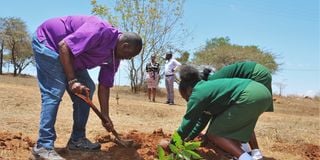Involve students in climate change fight

The head of the Anglican Church of Kenya Jackson Ole Sapit (left) and students plant tree seedlings at ACK Guest House in Makueni County on October 10, 2022. President William Ruto has said his government will plant five billion trees in the next five years, and an additional 10 billion by 2032.
Now that millions of students are on a long school holiday, it is important to have them play a role in mitigating the effects of climate change.
In Kenya alone, thousands of hectares of forests have been lost to deforestation, increasing the amount of carbon dioxide in the atmosphere. The other reason why countries are experiencing the negative effects of climate change is rapid industrialisation. Industries emit greenhouse gases that form a blanket over the globe, leading to global warming.
Due to these high temperatures, we now have more drought spells in many parts of Africa triggering water shortages in already water-stressed regions. This affects agricultural production and food security leading to famine and other forms of deprivation.
While there are many ways of countering the effects of climate change, planting trees stand out. This is why I am appealing to the country’s 15 million students in primary and secondary schools who are currently on holiday to immediately start planting trees.
If all of us students can plant at least 10 trees in our neighbourhoods and schools annually, this will add up to 150 million trees every year. This will be a major boost to the government’s plan of planting 15 billion trees in the next 10 years.
Freida Nyantino, The Kenya High School student
****
Kenya is at great risk of desertification due to climate change. Tree planting is one of the ways of dealing with the issue. President William Ruto has already announced that his government will see to the planting of 15 billion trees by 2032. The target is to have more than 30 per cent forest cover by 2030.
Apart from averting climate change, forests and trees play a crucial role in risk management, ensuring vulnerable households do not sink even deeper into poverty while others avoid impoverishment.
They perform this function by smoothing consumption and income across seasons and years through the provision of food, fodder, fuel, and other products that may be consumed at home or sold.
This role of forests and trees is especially relevant to the rural poor. The evidence that forests and trees support poor people to improve their well-being or mitigate risks is well-established.
Understanding the forest-poverty dynamics is necessary for future interventions that consider forests and trees as tools for poverty alleviation.
An important step in doing so is to quantify the economic and other benefits of forests and trees in national accounts and to systematically collect data on the diverse ways that forests and trees can contribute to national development agendas.
Samwel Obegi and Morgan Wanyonyi, Rongo University




